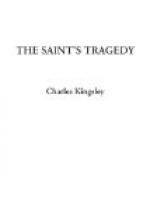Eliz. Command! Ay, that’s the phrase
of the world: well—tell
him,
But tell him gently too—that child and
father
Are names, whose earthly sense I have forsworn,
And know no more: I have a heavenly spouse,
Whose service doth all other claims annul.
C. Wal. Ah, lady, dearest lady, be but ruled!
Your Saviour will be there as near as here.
Eliz. What? Thou too, friend? Dost
thou not know me better?
Wouldst have me leave undone what I begin?
[To Count Pama] My father took the cross, sir:
so did I:
As he would die at his post, so will I die:
He is a warrior: ask him, should I leave
This my safe fort, and well-proved vantage-ground,
To roam on this world’s flat and fenceless steppes?
C. Pama. Pardon me, Madam, if my grosser wit
Fail to conceive your sense.
Eliz. It is not needed.
Be but the mouthpiece to my father, sir;
And tell him—for I would not anger him—
Tell him, I am content—say, happy—tell
him
I prove my kin by prayers for him, and masses
For her who bore me. We shall meet on high.
And say, his daughter is a mighty tree,
From whose wide roots a thousand sapling suckers,
Drink half their life; she dare not snap the threads,
And let her offshoots wither. So farewell.
Within the convent there, as mine own guests,
You shall be fitly lodged. Come here no more.
C. Wal. C. Pama. Farewell, sweet Saint! [Exeunt.]
Eliz. May God go with you both.
No! I will win for him a nobler name,
Than captive crescents, piles of turbaned heads,
Or towns retaken from the Tartar, give.
In me he shall be greatest; my report
Shall through the ages win the quires of heaven
To love and honour him; and hinds, who bless
The poor man’s patron saint, shall not forget
How she was fathered with a worthy sire. [Exit.]
SCENE III
Night. Interior of Elizabeth’s hut.
A leprous boy sleeping on a
Mattress. Elizabeth watching by him.]
Eliz. My shrunk limbs, stiff from many a blow,
Are crazed with pain.
A long dim formless fog-bank, creeping low,
Dulls all my brain.
I remember two young lovers,
In a golden gleam.
Across the brooding darkness shrieking hovers
That fair, foul dream.
My little children call to me,
‘Mother! so soon forgot?’
From out dark nooks their yearning faces startle me,
Go, babes! I know you not!
Pray! pray! or thou’lt go mad. . . . . . The past’s our own: No fiend can take that from us! Ah, poor boy! Had I, like thee, been bred from my black birth-hour In filth and shame, counting the soulless months Only by some fresh ulcer! I’ll be patient— Here’s something yet more wretched than myself. Sleep thou on still, poor charge—though I’ll not grudge




